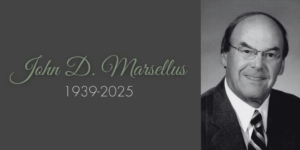For Black History Month, we chose to highlight two of our Black Equity & Excellence Fund grantees that were named after historical figures: The William Herbert Johnson Bar Association of CNY and the Paul Robeson Performing Arts Company. They are both Black-led organizations, named after historical Black figures and supported by Black women with their own notable careers. Their similar struggles and triumphs, along with some amazing historical connections, make their shared story phenomenal.
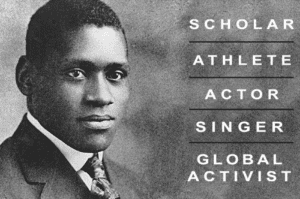
In 1982, Professor William H. Rowland II and Roy E. Delemos, founded the Paul Robeson Performing Arts Company (PRPAC), named after the world-renowned performer and activist. Later, in 1988, Black students from Syracuse University (SU) gathered together to protest the lack of performing arts opportunities for the Black student body. In response, SU brought PRPAC into their African American Studies Department as a community outreach component, a partnership that lasted until 2010.
In 2014, Lanessa Chaplin was starting her career as an attorney in Syracuse. As a young, Black, female attorney, she found herself looking for a professional association that would allow Black lawyers to share experiences and support each other through the unique challenges of bias and discrimination that they faced in their careers. She called the national Black Bar Association to ask if there was a local chapter in Syracuse, but there was not. She then reached out to Judge Langston McKinney, Syracuse’s first Black judge, to ask if there was a group of Black attorneys but learned that nothing had yet been formed.
Chaplin persisted and began to gather colleagues together organically. In their first meeting, Paula Johnson*, an SU Law School professor, recommended that the organization be named after William H. Johnson, the first Black attorney to graduate from the school. Professor Johnson’s biography about Johnson introduced him and his achievements to many who had never heard his story.
History
Paul Robeson and William Herbert Johnson shared a fate that changed their lives. Both Robeson and Johnson graduated from law schools, they were both denied access to their professions because of their race and they both ended up taking different career paths as a result. They were also determined social justice advocates who continued to fight for equity and inclusion throughout their lives.
Johnson, a Syracuse native, graduated valedictorian of his SU Law School class in 1903. He was relegated to the outside of many classrooms because of the color of his skin, forcing him to take notes from the hallway. And even though he graduated top of his class, he was never admitted to the New York State Bar. He became a janitor as his main profession and while he never practiced law officially, he helped to desegregate the Syracuse fire and police departments. “He wrote all the motions, but the white attorneys signed them,” stated Chaplin.
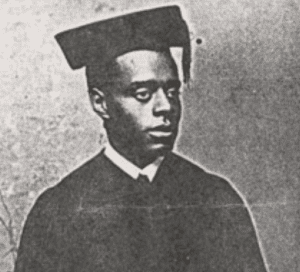
Johnson was also very instrumental in helping to establish The Dunbar Center, which has become an epicenter of Black life in Syracuse, including providing academic support to students and a variety of services to senior citizens. He continued his passion as a street lawyer, giving people advice on how to manage their legal situations or referring them to attorneys with whom he had close relationships. On October 18, 2019, Johnson was posthumously admitted to the NYS Bar at a ceremony which was attended by his grandsons, Calvin and Thomas Johnson.
Paul Robeson was a magnificent actor and singer, known for his role in the London and Broadway productions of Shakespeare’s Othello, among many other movie and stage roles. His chosen profession was law. He first attended Rutgers University, graduating as valedictorian, and then graduated with his law degree from Columbia University Law School in 1919. He joined a law firm but one of the white secretaries refused to take dictation from him because he was Black. He quit the job and the profession, leading him to pivot to a career in performance while becoming known for his bass-baritone singing voice.
Later in Robeson’s career, his social justice advocacy and outspokenness made him a target of the American government. In a biography published by Rutgers University, Robeson was described as “a national symbol and a cultural leader in the war against fascism abroad and racism at home.” In the 1940’s, he was considered “a major threat to American democracy” due to his Black nationalist and anti-colonialist activities. Robeson was a true Renaissance man and has been honored by being the namesake for PRPAC, but also by Rutgers’ Paul Robeson Cultural Center, Paul Robeson Boulevard, Paul Robeson Library, and more.
Modern Day Organizations
These two organizations were historically linked by the hard work and determination of Judge Langston McKinney. In 1982, PRPAC reached out to the only all-Black law firm in Syracuse, The Law Offices of Maye, McKinney and Melchor to apply for their 501-c-3 organization. Langston McKinney later became the judge who helped form the WHJ Bar Association.
The Paul Robeson Performing Arts Company is coming up on its 40-year anniversary. Over the course of its history, PRPAC has performed many dramatic and musical productions including their annual Motown Revue. Karin Franklin-King, board officer and facilitator, started with PRPAC in 2000 and is known for her work in TV and radio, including hosting the television show, “Open Line.” She also was a professor at Syracuse University’s Newhouse School of Public Communications.
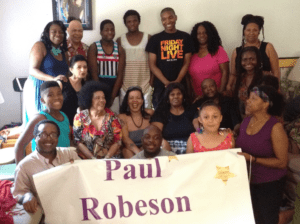
Since 2010, the all-volunteer board has managed the company’s productions and has partnered with other Black-led organizations, including the 100 Black Men of Syracuse and SU’s Community Folk Art Center. Running a theatre company requires funding for staff, performers, marketing and more. With a grant from the Black Equity & Excellence Fund, Franklin-King says they have goals of growing PRPAC to its former glory as a premier arts organization, raising awareness for Black equity, developing and implementing fundraising and ushering in young entrepreneurs, performers, writers and technicians. They are also working to expand their board and have added an executive artistic director, Stephfond Brunson.
“Black performers might work in other theater companies where they may not be able to fully express their culture, but when they’re in a space where the culture is understood, the performers can excel,” said Franklin-King. “We work very hard to give people the opportunity to express themselves in a safe environment while they develop their skills.”
She went on to say, “We’re in a Black theater desert. The Syracuse community needs Black culture in the arts to really stand out. We can keep our millennials and our young people in Syracuse when our community has this kind of culture. We want the Paul Robeson Performing Arts Company to be Syracuse’s outstanding Black theater company. We want to be part of the Black Renaissance.”
The William Herbert Johnson Bar Association of CNY is striving to advance equity and excellence in the pursuit of justice, addressing legal issues affecting the Black community and fostering relationships between Black attorneys and community law firms, while encouraging the personal and professional development of young lawyers and law students. Like PRPAC, WHJ Bar Association truly values Syracuse-based law students and attorneys and hopes to retain Syracuse talent.
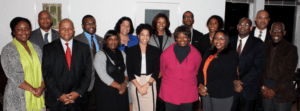
“Retention is low in Syracuse for Black attorneys,” said Chaplin. “Despite the Black and Brown population being close to 47% in the Syracuse area, less than 2% are Black attorneys.”
A recent Black Equity & Excellence Fund grant will help the WHJ Bar Association to host forums, events and panels. They also plan to build a website and directory for community members seeking assistance, guidance, or representation by Black attorneys and allies, which would also include relevant laws, legislation and issues specific to the Black community.
Lanessa Chaplin was given a script about William Herbert Johnson’s life, written by his grandson. Perhaps, over time, PRPAC can bring forward his story and the story of so many of Syracuse’s Black historical figures that are all just waiting to be told. Syracuse is ripe for a renaissance. With so much amazing history and talent, both of these organizations, along with other Black-led organizations, can flourish in what many feel has been a cultural desert. Click here for more information on the Black Equity & Excellence Fund.
*Not a family relation of WHJ


